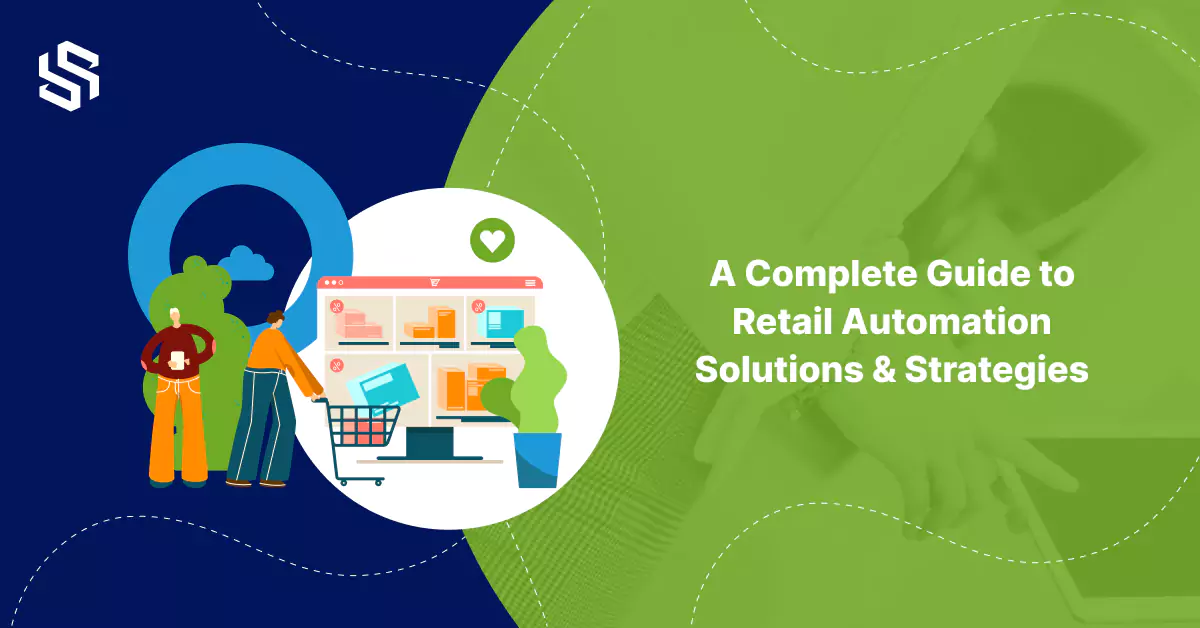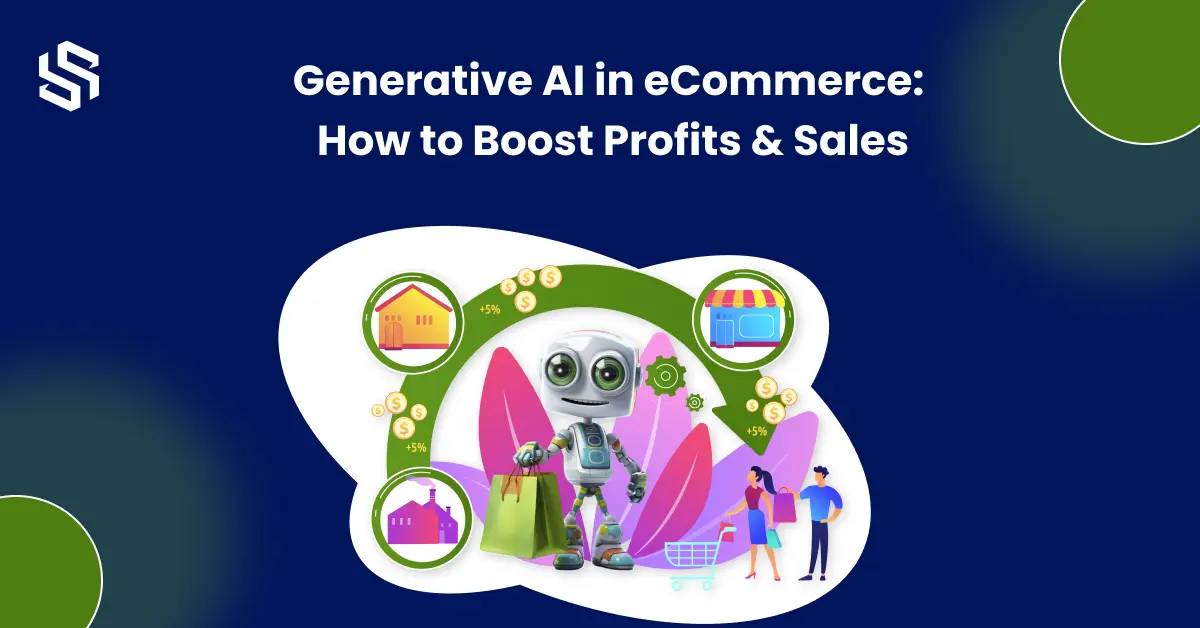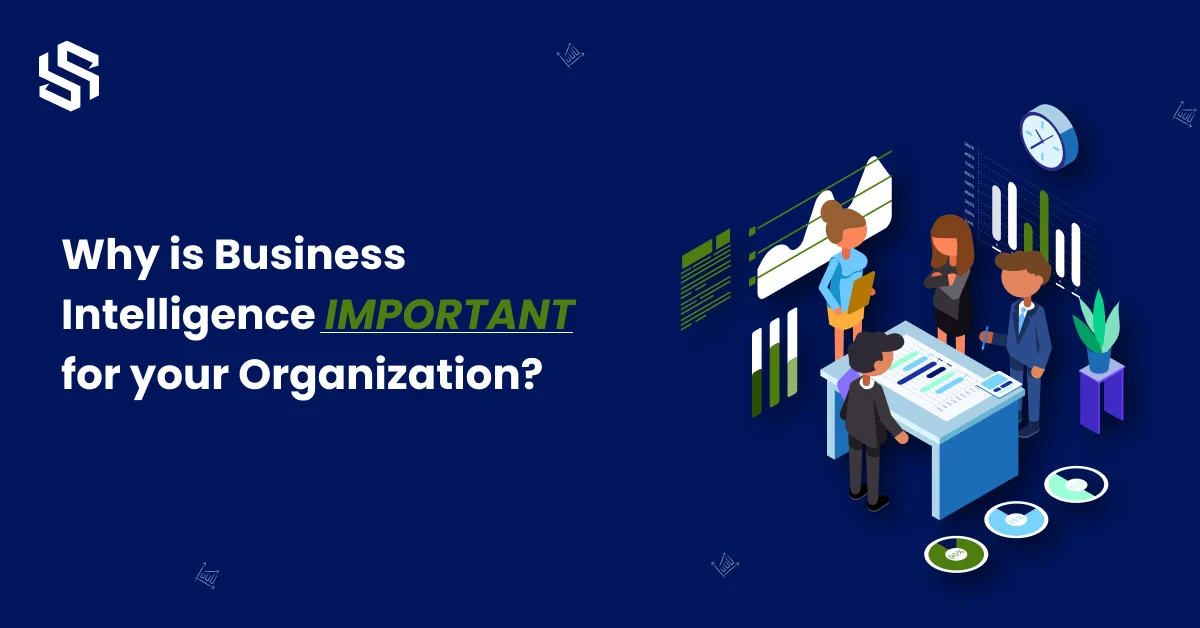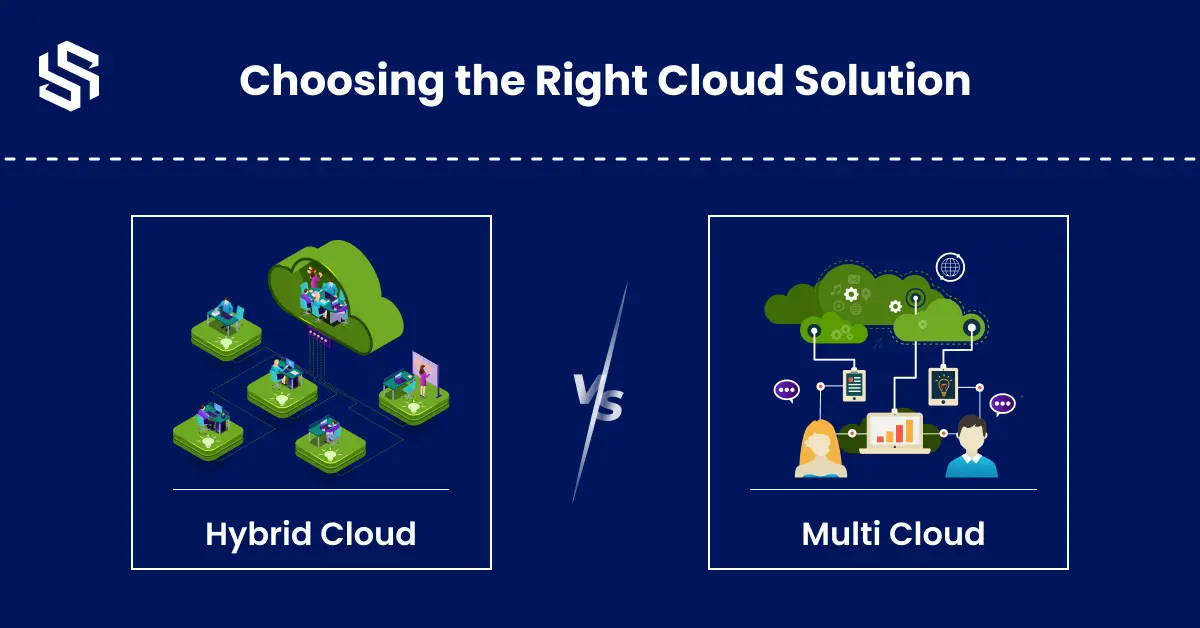In the ever-changing arena of technological innovation, companies seeking competitive advantage have turned to Custom software development services. This is where the expertise of seasoned professionals comes in handy, and thereby begins a journey of individual solutions. Moreover, this is where the hiring software developers decision emerges as the spearhead for this transformational process. It delves into the world of custom software development and explores its manifold advantages and why it’s important for businesses to consider recruiting skilled developers. Come on board this enlightening journey where innovation meets expertise and redefines the future digital state of businesses around the globe.
What is Retail Automation?
Retail Automation refers to the use of technology to smoothen and optimize a variety of processes in a retail shop. These technologies include point-of-sale systems, inventory management and automated check-out among others which enable operational efficiency and better customer experience.
Global Retail Automation Market Insights 2023-2032
Global retail automation market has come out as a powerhouse exhibiting strong expansion and transforming potential. Based on recent data, the market size amounted to USD 18.62 billion in 2023 which is an impressive amount. What’s even more impressive is the projected trajectory: a Compound Annual Growth Rate (CAGR) of 10.2% leading to a market worth approximately USD 44.54 billion by 2032.
Ready to elevate your operations? Hire web app developers from our leading custom web application development company.
Explore our expertise in ReactJS, Node.js, AngularJS, Vue.js, and Laravel. Take the first step towards innovation!
What are the Types of Retail Automation?
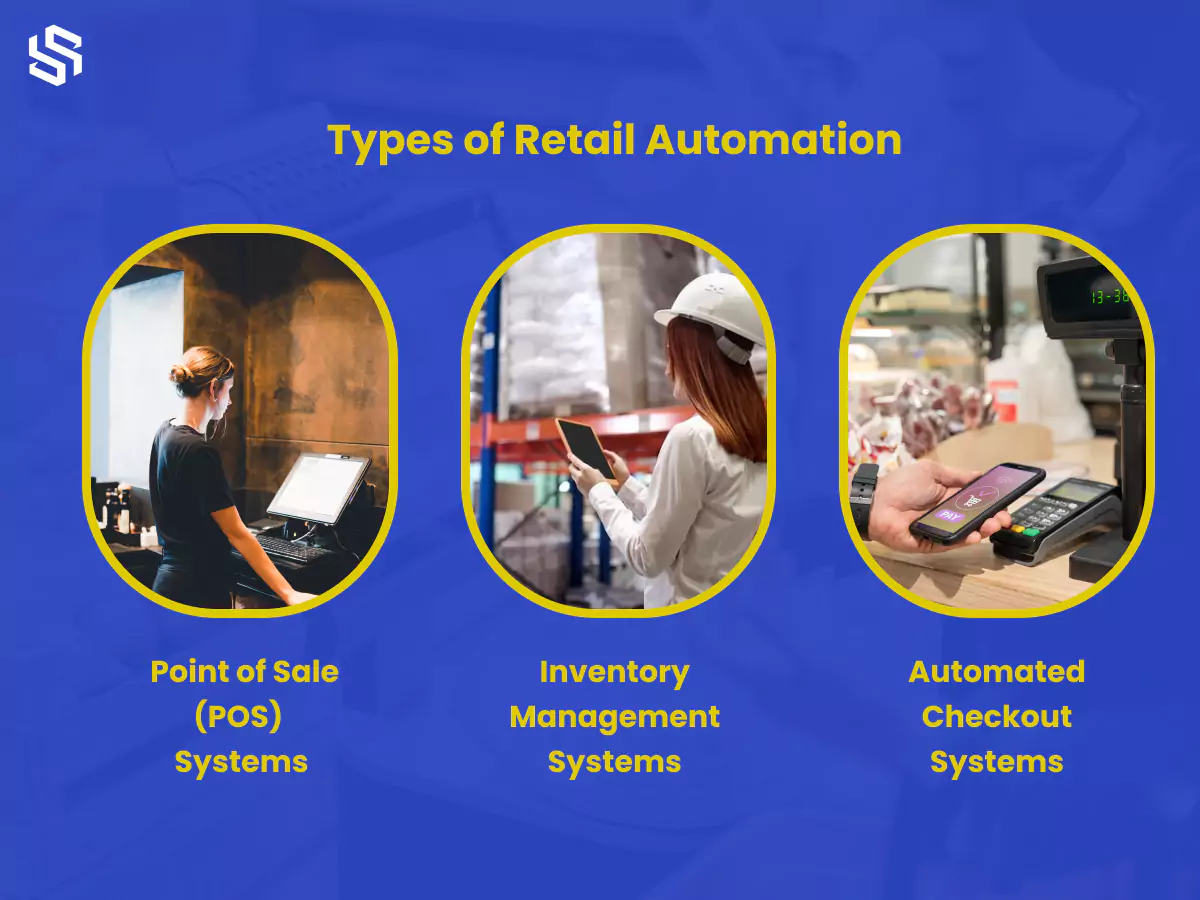
1. Point of Sale (POS) Systems:
Retail automation starts with POS systems that have redefined payment and transaction systems. They allow all the sales process from scanning an item to making payments happen seamlessly.
Key Features:
- Transaction processing
- Inventory integration
- Sales reporting and analytics
2. Inventory Management Systems:
Businesses can use Inventory Management systems for stock balances tracking at real-time which will help them know if they are running out of products or not.
Key Features:
- Real-time inventory tracking
- Automated reordering processes
- Forecasting and demand analysis
3. Automated Checkout Systems:
These might be self-checkout kiosks or cashier-less systems that attempt to minimize queues and waiting times for customers.
Key Features:
- Contactless payment options
- Barcode scanning technology
- Enhanced customer checkout experience
What are the Key Components of Retail Automation
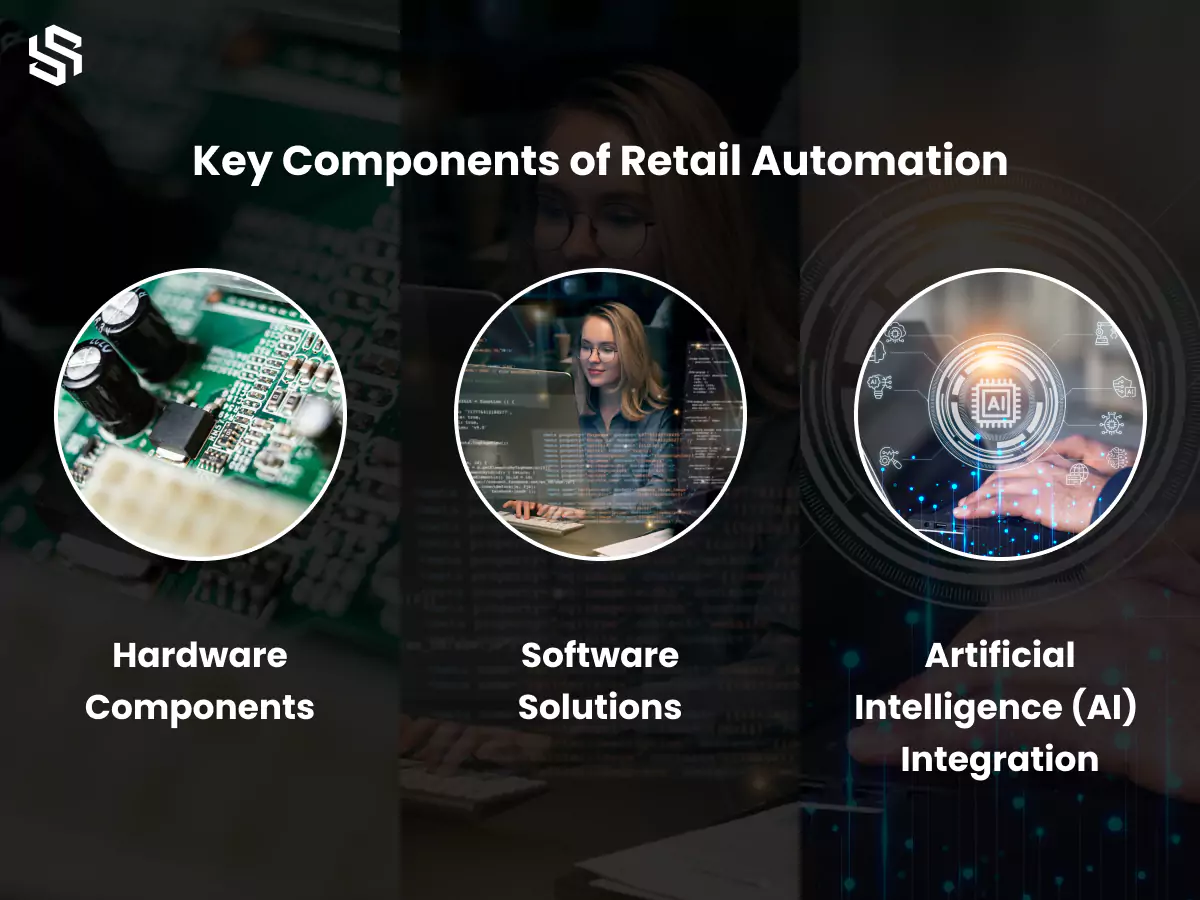
1. Hardware Components:
Scanners and Sensors:
- Scanners: They are used in POS systems to ensure accurate identification of items.
- Sensors: They enable the store to have automated product movement tracking.
Self-Checkout Kiosks:
- Hardware interfaces for automated checkout processes.
- Include touchscreens, barcode scanners, and payment terminals.
2. Software Solutions:
Point of Sale Software:
- Manages sales transactions, inventory, and customer data.
- Provides reporting and analytics for informed decision-making.
Inventory Management Software:
- Enables real-time tracking of inventory levels.
- Automates reordering processes based on demand forecasting.
Checkout Software:
- Powers the functionality of automated checkout systems.
- Integrates with payment gateways for seamless transactions.
3. Artificial Intelligence (AI) Integration:
Personalized Recommendations:
- AI algorithms analyze customer behavior to offer personalized product recommendations.
- Enhances the shopping experience and increases customer engagement.
Predictive Analytics:
- Utilizes historical data to predict future trends and demand.
- It also helps companies optimize inventory and pricing strategies.
A Few Examples of Automated Retailing
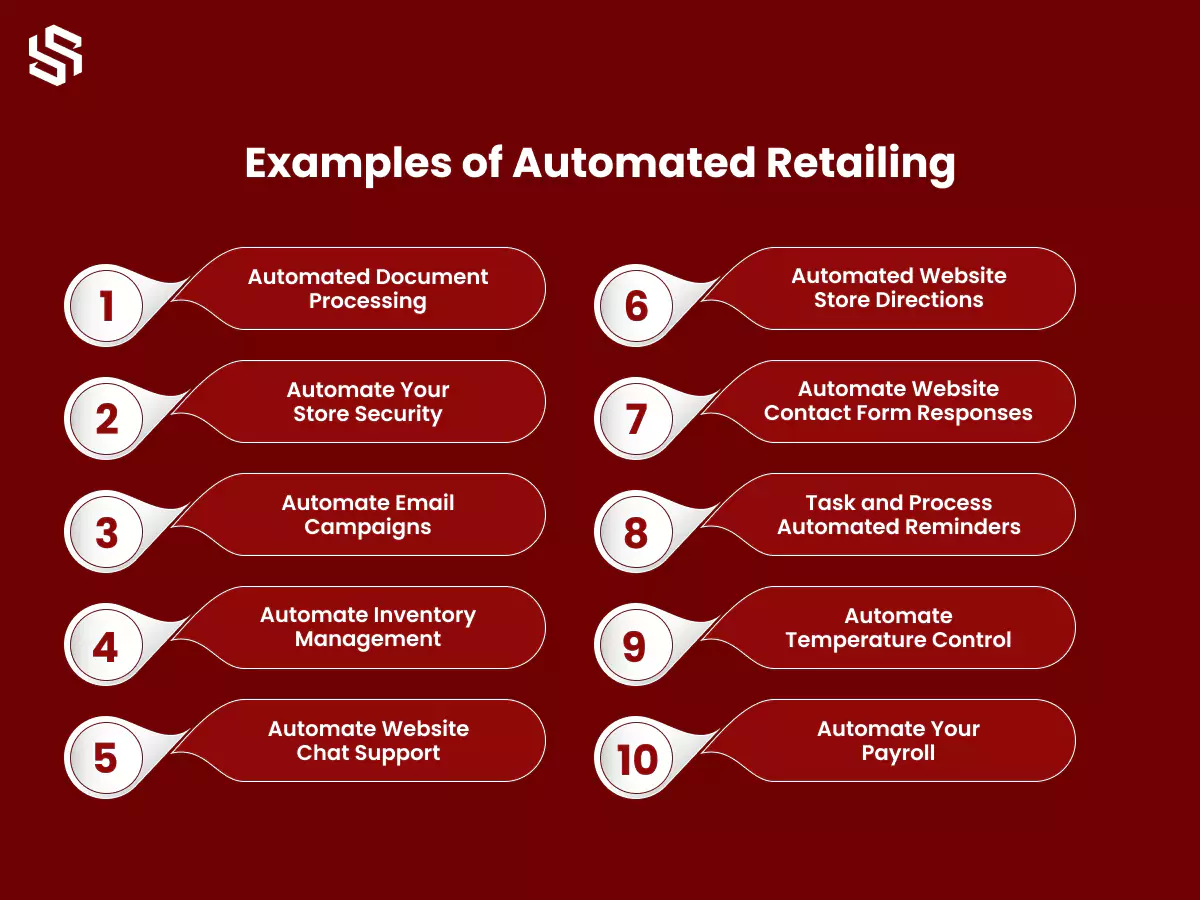
1. Automated Document Processing:
Automated document processing helps simplify work with papers, invoices and contracts. Such automation is performed through the utilization of Optical Character Recognition (OCR) and machine learning algorithms that help to extract information accurately, thereby reducing manual data entry and making administrative tasks more efficient.
2. Automate Your Store Security:
Automated store security involves the use of AI surveillance systems that can identify abnormal activities or potential threats. Access controls are made better by facial recognition technology and automated alerts for security incidents result in prompt action against security risks, thus offering strong protection to businesses in the retail sector.
3. Automate Email Campaigns:
This is where tools for marketing automation come into play as they support scheduling, tailoring, and delivering personalized email messages to customers. This approach ensures timeliness, tailored content delivery as well as analysis of customer engagement thus enhancing marketing efforts efficacy over time.
4. Automate Inventory Management:
To achieve this goal, an automated inventory management system tracks merchandise as it moves in and out of a store, reorders items when needed and manages supply chains effectively Software solutions are used to monitor stock levels; reorder products; manage supply chains so as to make inventory control more efficient and accurate while reducing human error.
5. Automate Website Chat Support:
This involves using chatbots on websites so that they can engage site visitors in real-time answering their questions. This approach creates an even faster response rate thus bringing about overall customer satisfaction besides other things freeing up personnel necessary for managing complicated inquiries.
6. Automated Website Store Directions:
Automated website store directions employ geolocating and mapping technologies to guide customers on the location of their nearest stores. If any organization has such features embedded within their website then physical stores will never be a problem due to a time-saving process for finding them.
7. Automate Website Contact Form Responses:
Setting up auto-reply or trigger responses that acknowledge user inquiries is an example of automating website contact form responses. This guarantees the timely confirmation of the customer’s message, giving a client a positive impression about your responsiveness and efficiency in attending to their needs.
8. Task and Process Automated Reminders:
Automated reminders make it easier for employees and managers to keep up with various deadlines, appointments or important undertakings. With this option, they will always stay concentrated and on time, which can prevent some misunderstandings and mistakes along the way.
9. Automate Temperature Control:
For automation of temperature control in commercial spaces, smart systems are installed that regulate heating, ventilation and air conditioning (HVAC) as per predefined settings. A comfortable shopping environment is ensured while also conserving energy using this means.
10. Automate Your Payroll:
It is about applying software programs for calculating employee wages, taxes and deductions more accurately while also minimizing errors in such calculations as done manually. Minimizing errors, turning into a timesaver and maintaining compliance with payroll rules in use has been an objective every small business looks forward to other than being able to focus on its core operations instead of dealing with manual payroll duties.
These examples highlight the different uses automation can be put into practice at retail sector, showing how technology can optimise processes, improve customer experience and contribute to overall efficiency within the retail industry.
The Importance of Automation in the Retail Sector
Let’s delve into the key reasons why automation is increasingly essential in the retail sector.
1. Operational Efficiency:
By automating regular operational activities, it is possible to minimize human efforts and mistakes. This allows smooth operations and better management of resources through such areas as inventory control or order processing.
Advantages:
- Faster Processes: Automation ensures that work gets done on time.
- Reduced Errors: This reduces chances of making mistakes such as data entry or delivering orders to wrong places.
2. Improved Customer Experience:
Automation significantly enhances the experience a client gets while engaging with a retail business. Automated systems make recommendations based on shopping history, facilitate easy checkouts among others.
Advantages:
- Personality: Suggests products for an individual customer’s taste.
- Checkouts that Work: It allows customers to avoid waiting and thus enhances overall satisfaction.
3. Adjustment to E-Commerce Trends:
E-commerce has altered consumer behavior as online buying becomes more popular. In order to follow this trend, dealers undertake optimization of their online platforms, implement effective order processing systems, and deliver a consistent omnichannel experience.
Advantages:
- Efficient Order Fulfillment: This helps ensure that online orders are processed quickly.
- Omnichannel Integration: Online and offline channels can be seamlessly blended together in a way that gives customers one shopping platform.
4. Data-Driven Decision-Making:
Automated processes provide retailers with useful information for decision-making purposes. Such insights come from managing stock or even running marketing campaigns since they help in understanding customer behaviors, predicting future happenings as well as running businesses efficiently.
Advantages:
- Better Inventory Control: Makes use of data in managing stocks accurately.
- Marketing Segmentation: Helps come up with personalized marketing strategies using customer data.
5. Cost Reduction and Profitability:
Retailers can save significant amounts of money by automating routine functions and streamlining their operations. These include reduced labor expenses, zero costs due to mistakes and more focus on high-value activities that drive business growth.
Advantages:
- Minimized Labor Costs: Much less human labor is required once automation is in place.
- Optimized Resource Allocation: This allows companies to concentrate on strategic initiatives for business growth.
Inspire innovation with seamless integration. Trust a reliable software development company for custom Shopify development services. Let’s innovate together!
Key Retail Automation Trends Expected Beyond 2024
The retail industry is in the midst of significant change through the integration of state-of-the-art technology. These are some of the major trends to look for in shaping the retail landscape, which provides a window into what might be coming next as far as commerce is concerned.
1. Autonomous Delivery Vehicles:
The emergence of self-driven drones and delivery bots has changed last mile delivery. These vehicles facilitate movement of products hence reducing shipping time and costs, as well as increasing efficiency in logistics networks.
2. AI-Driven Supply Chain Optimization:
Supply chain management is now dominated by advanced AI algorithms. Such kind of AI ensures that supply chains predict demand patterns and adjust inventory levels real-time leading to smoother flow management and lower operations costs.
3. Augmented Reality Shopping Experiences:
Augmented Reality (AR) applications have changed how customers shop. Customers can try out clothes virtually, evaluate items and see them within their own environments resulting into the blend between online and offline shopping with immersive features which allows interaction between them.
4. Voice Commerce and AI Assistants:
Chatbots and AI-powered virtual assistants have become core features of customer care service as well as product recommendations. Irrespective of which channel the customer chooses to use, these technologies offer consistent personalized assistance thereby enhancing overall shopping experience.
5. Sustainability and Green Automation:
There is a growing attention on sustainability happening within retail that cannot go unnoticed. Automation plays a key role in reducing energy consumption, optimizing transportation routes with low emissions, resourceful utilization to manage waste among other environmentally friendly practices thus positioning businesses into sustainable practices.
To better understand more about these trends by exploring practical examples from real life cases.
Real-World Case Examples of Retail Automation
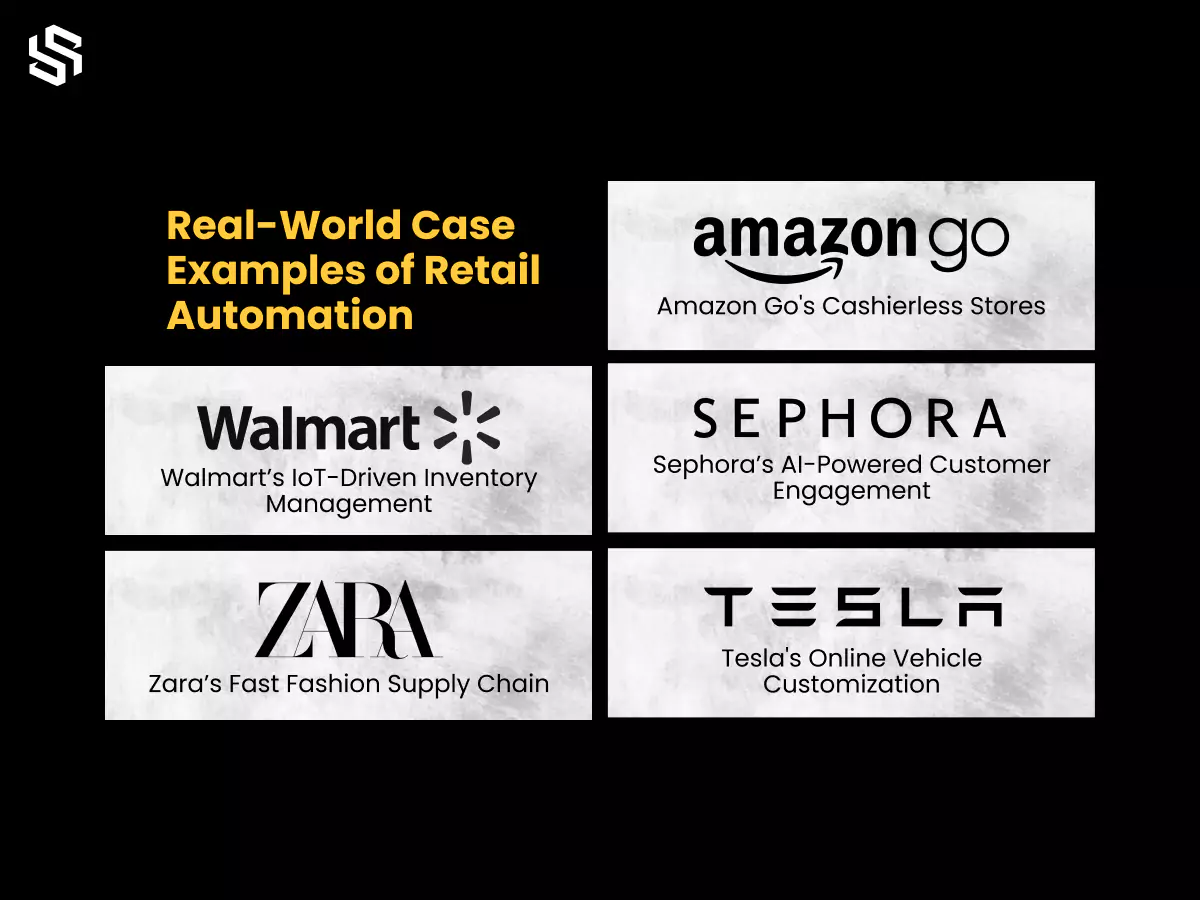
1. Amazon Go's Cashierless Stores:
Cashierless stores have revolutionized the in-store experience and this is what Amazon Go has achieved. Whenever shoppers step into the shop, they just pick the items they need and leave since technology automatically records their choices and debits their accounts.
Impact:
The elimination of regular checkout lines has reduced delays to a great extent, thus improving shopping as a whole and establishing a new model for smooth retailing.
2. Walmart’s IoT-Driven Inventory Management:
Walmart has adopted sensors that are fitted in its stores and supply chain channels, which are part of embracing the Internet of Things (IoT). These sensors work by monitoring real-time inventory levels that are transmitted to a central location where stock levels are tracked while any shortages auto trigger reordering.
Impact:
This approach ensures that customers can always find the product they want from Walmart’s shelves, eliminates times when there is no stock, and sales can be maximized through optimal inventory management.
3. Sephora’s AI-Powered Customer Engagement:
Leading beauty retailer Sephora uses AI to improve customer engagement. This technology takes into account information on past purchases as well as preferences thereby enabling it to provide personalized recommendations on products purchased thereby leading to more interactive and tailored shopping experiences.
Impact:
In addition to enhanced customer satisfaction, Sephora’s AI-driven approach results in more sales through effective cross-selling and upselling.
4. Tesla's Online Vehicle Customization:
Tesla gives an opportunity for its customers to customize their desired vehicles before buying them from their website. The platform provides a detailed view of the chosen configurations, making the buying process more transparent and convenient.
Impact:
This online customization feature will streamline a customer’s purchasing journey while leaving it truly personal, thus enhancing Tesla’s image as an innovative manufacturer.
5. Zara’s Fast Fashion Supply Chain:
When it comes to supply chain agility, Zara is one of the fastest fashion brands. Zara uses real-time data in order to respond to changing trends quickly, producing and delivering new collections into stores at an unprecedented rate.
Impact:
By operating fast fashion supply chain Zara is able to predict what will be trendy tomorrow, minimize obsolete stock levels and adapt promptly according to its consumers’ tastes.
These 5 instances indicate how powerful retail automation can be when applied strategically. Retailers who embrace automation can achieve exceptional outcomes ranging from attaining higher level of customer satisfaction or considerable savings on costs.
Elevate your business with our expertise in Angular.js development services and Laravel Development Services.
Seeking skilled developers? Look no further! Hire web app developers to craft success stories with Angular.js and Laravel.
Case Study: Successful Implementation of Retail Automation in Colorhunt Clothing
Transformative effects were visible in the successful implementation of retail automation, where it was evident that Colorhunt Clothing took great strides to overcome hurdles such as an outdated admin panel and restrictive mobile access. Thus, adopting more advanced technologies like Laravel and Angular JS led to a resultant enhanced codebase, responsive design, and comprehensive reporting abilities.
The integration of a user-friendly mobile app facilitated more direct orders and inventory management while server deployment with 24/7 support assured security. This transformation marked out Colorhunt Clothing as the epitome of tech-savvy leadership for improved workflow efficiency thereby enhancing its reputation as one of the most dependable sources of high end male clothes in an increasingly competitive textile manufacturing environment.
Key Strategies of Implementing Automation in Your Retail Business
In order to successfully introduce automation into your retail business you need to plan carefully and execute strategically. Below are some key strategies that will enable you to leverage the power of automation for your company:
Thorough Business Analysis:
It is important for you to take a good look at all your current systems so that you can identify areas that would benefit from being automated. Look for specific pain points or areas where automation might offer answers.
Set Clear Objectives:
Make sure that your objectives for automating are clear and attainable. Whether it is increasing operational efficiency, improving customer experience or lowering costs – having well defined goals will ensure a focused implementation.
Technology Assessment:
Evaluate different types of available automation technologies. These should be solutions that match the needs of your business and are adjustable to future changes. For instance, see whether applications allow for easy integration too.
Employee Involvement and Training:
Involve the employees in automating your business process since this helps them adjust through training programmes conducted by yourself. Address their concerns if any arise, they want to know how the system will benefit them.
Phased Implementation:
Instead of going all out at once, introduce automation gradually in stages. This way helps to achieve smoother handovers, reduce disruptions and fix any issues before full deployment.
Data Security Measures:
Ensure data security during the implementation of automation measures. Ensure compliance with necessary laws, use encryption methods and have guidelines on how data should be secured thus making customers trust you more with their information.
Integration with Existing Systems:
Make sure that the introduction of automation tools does not conflict with existing systems. Compatibility is important for smooth flow within the organization. Therefore, centralizing operations allows employees to coordinate better while at the same time minimizing disruption.
Performance Monitoring and Optimization:
Implement monitoring tools to track automated processes’ performance levels. Always scrutinize findings then optimize workflows as needed. This ensures that there is a link between evolving organizational goals and automated activities through continuous improvement.
Scalability Considerations:
Have scalable automated solutions because automation should accommodate company growth in future. While choosing features and processes that integrate easily into one another or meet changing needs, corporate infrastructure must remain open to adaptation.
Customer-Centric Approach:
Focus on solutions that enhance customer experience above all. For example: personal interactions with clients, shorter checkout processes, faster response time to service inquiries etc. Thus, automated services focused on customers can help build loyal followings and satisfaction as well.
Regular Assessments and Feedback:
Also, it is important to conduct regular surveys among your employees as well as with your customers. Their answers are vital for adjusting automated processes and unveiling new difficulties.
Propel your retail business to new heights with our custom Shopify development services.
Seeking Shopify experts?
Your journey begins here! Hire web app developers for a bespoke Shopify experience.
Syndell: Embrace the Power of Automated Retail Technologies
Syndell is a leading company in automated retail technologies that gives a glimpse at what the future of shopping will look like. We are an excellent custom software development company specializing in innovative solutions that redefine the retail experience. Our Custom Web Application Development Services assure you seamless and intuitive interfaces while our AI ML Development Services bring Artificial Intelligence and Machine Learning within reach for your business.
In the competitive retail marketplace, adoption of automated retail technology is not an option but an imperative for survival. Syndell acts as a gateway to this transformative journey which are innovative software solutions utilizing AI and ML. In this regard, the integrated adoption of automated technologies becomes the catalyst for effectiveness, satisfaction and growth as we navigate through the future of retail.
By Jigar Borde, our dedicated developer has demonstrated their wealth of knowledge in developing tailor-made solutions. You can hire our AI ML Developers when you want to promote your business.
Contact Us today so that we can take you into a world where technology meets invention and enhances your digital era’s success by remoulding your retail experience.
Start now on your journey to becoming an advanced retailer.
FAQs
Automation in retail enhances efficiency, reduces human errors, and boosts customer satisfaction through streamlined processes and faster transactions.
Automation improves business by minimizing labour costs, optimizing workflows, and allowing employees to focus on high-value tasks, ultimately increasing profitability.
The future of automation in retail will depend on advanced technologies e.g. AI and machine learning that create personalized customer experiences and supply chains revolutionized for greater efficiency.
Evaluate your business needs first, search for available technologies, and then write down a detailed implementation plan. Make sure you involve the key stakeholders, train employees and finally go live with one phase at time for smooth running.
When assessing automation needs, identify specific areas for improvement within your operations; discover which solutions support your business goals; research widely on available options.


